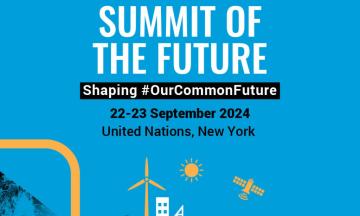
At the Summit of the Future, the Green Jobs for Youth Pact emphasized the importance of consulting with youth, removing barriers to their meaningful engagement, and fostering intergenerational dialogue, all in support of the broader UN goal to ensure that youth have a seat at the table in national policymaking and decision-making processes.
The Pact ensured meaningful youth participation through two dialogues:
Youth Forum on the Future of the Environment
The first event, the Youth Forum on the Future of the Environment, co- organized by the Children and Youth Major Group (CYMG) to UNEP, focused on the transformative potential of green jobs for young people. The event featured several key speakers who shared their insights including Inger Andersen, Executive Director of UNEP, Abdullah Bin Ali Al Amri, President of UNEA 7, Maria Ivanova from Northeastern University amongst others.
Key takeaways from this forum highlight:
- the urgent need for updated curriculums that respond to current green job market demands and green transition, with sustainability at the core,
- bridging data gaps in research is crucial for effective policymaking and action
- a whole-of-government and whole-of-society approach is necessary to integrate sustainability and green skills into education systems.
This event set the stage for a deeper exploration of the commitments and actions needed to support youth in this transition.

Side Event on Empowering Youth for Sustainable Futures
The second dialogue, a side event on "Empowering Youth for Sustainable Futures: Intergenerational Responsibility and Skills for a Just Transition," further elaborated on the role of the Green Jobs for Youth Pact in advancing a just transition to sustainable, circular and inclusive economies. The event amplified the voices of youth, member states, education partners, private sector and UN agencies committed to work for a better Future.
“We need to support youth empowerment and upskilling, through public-private-youth partnerships that change education systems – from university courses to on-the-job training. One such partnership is the Green Jobs for Youth Pact.” stated Inger Andersen Executive Director, UNEP.
Laura Thompson, Assistant Director-General of the ILO, emphasized that the youth will have to “learn how to learn and relearn” and to adapt to changing job markets.
UNICEF’s Executive Director, Kitty van der Heijden presented their contribution to the Green Jobs for Youth Pact through the "Green Rising” initiative that empowers young people to youth-led climate action.

Commitments from Member States and the Private Sector
Member states also shared their commitments to empowering young people through green jobs. India highlighted its Lifestyle for Environment (LiFE) initiative, promoting sustainable lifestyles through sustainable consumer choices and integrating green education into curricula. Cuba, already a beneficiary of a United Nations Development Account project, led by the Pact: Strengthening Policies and Capacities for Green Jobs for Youth In Africa and the Caribbean, presented its "Tarea Vida" project, which promotes a circular economy in key sectors like sugarcane and announced its continued commitment to work with Green Jobs for Youth Pact. to join the Green Jobs for Youth Pact.
Armenia, Portugal, and Cyprus shared their commitment to education reforms aimed at equipping young people with green skills. Cyprus emphasized the need for strong mechanisms to implement national action plans and strategies on youth empowerment and expressed its commitment to join the Green Jobs for Youth Pact.
The private sector also stepped up with commitments. Ramboll announced its goal to train 1,000 young people by 2025, while LinkedIn shared data showing a growing demand for green jobs among youth, urging for systemic changes in education and policies to bridge the skills gap.

A Call to Action
Through the Green Jobs for Youth Pact initiative, the International Labour Organization (ILO), the United Nations Environment Programme (UNEP), and the United Nations Children's Fund (UNICEF) are committed to empowering young people through capacity building, promoting meaningful youth engagement and representation in United Nations forums and strengthening intergenerational partnerships.
All partners are invited to join efforts and accelerate actions towards creating a greener and more decent future for our youth by partnering with the Green Jobs for Youth Pact.
Register your interest to join here and be part of this transformative movement.
